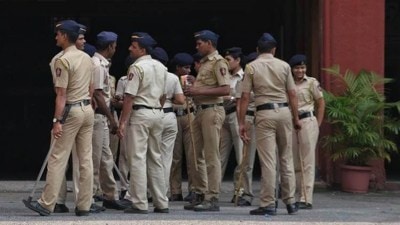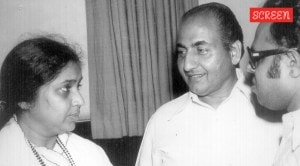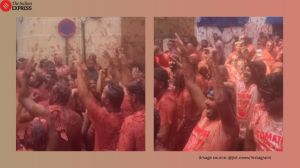UP man vanished after a 1999 murder in Saudi Arabia. 26 years later, CBI found him
As per the probe agency, the case came to light in 1999 when a body was found in a water tank in Saudi. The accused, Mohammed Dilshad, was arrested on August 11 this year
 Saudi authorities claimed that Dilshad, who was working at the same warehouse, was behind the murder. (File Photo)
Saudi authorities claimed that Dilshad, who was working at the same warehouse, was behind the murder. (File Photo)Standing in the Rouse Avenue court on Thursday was a skinny man dressed in tattered clothes. His wrinkled face sported a dusting of white stubble. His hands held tight by a police officer, he wore a petrified look.
“Can you read? Can you write?” the judge asked him. “Sir bas mai sign karna jaanta hun. Padhai nahi kiya hun (I’m illiterate… I only know how to sign),” came the response.
The skinny man is Mohammed Dilshad, a resident of Uttar Pradesh’s Bijnor. On August 11, an hour past midnight, he was arrested by the Central Bureau of Investigation (CBI) at the airport as soon as he landed in India.
He was wanted for allegedly murdering an unidentified man in Saudi Arabia, where he was working, in October 1999. For close to 26 years, the CBI said, he had been allegedly hiding from the Indian and Saudi Arabian authorities by “forging” passports and travelling to multiple countries.
The CBI lodged an FIR in the case on April 29, 2022, based on information received from sources in Saudi Arabia.
The FIR claimed that in 1999, Saudi national Abdullah Muhammad Saleh Alhajai reported an unpleasant odour coming from a water tank inside the warehouse of his establishment in Alsali district. Inside, authorities discovered the body of a man, purportedly Asian and in his 30s.
Saudi authorities claimed that Dilshad, who was working at the same warehouse, was behind the murder. An in-absentia arrest warrant, dated August 6, 2000, was issued against him by the Saudi authorities, but he could not be questioned as he had “escaped” from the country.
“A request for local prosecution of Mr Mohammad Dilshad, Indian national, wanted in Saudi Arabia for the murder of an unknown person, has been received from the Attorney General of the Kingdom of Saudi Arabia through the Royal Embassy of Saudi Arabia in New Delhi,” the CBI’s FIR stated.
“The Royal Embassy of Saudi Arabia in New Delhi, through the Ministry of External Affairs, had forwarded an extradition request, forwarding therein an in-absentia arrest warrant… against accused Mr Mohammad Dilshad…,” it added.
What made the Saudi authorities suspicious of Dilshad, a guard working at the warehouse on a meagre income?
In his statement, Alhajai said shortly after the murder, Dilshad informed him that his wife, who was in India, was ill and admitted to a hospital. He had asked Alhajai to allow him to leave India. “His face looked different… he was crying. He paid for his ticket and left… for India on 10/10/1999,” the FIR stated.
It was another Indian national’s statement that made Dilshad the prime suspect. Aqeel Ahmad Wazir, who claimed to be friends with Dilshad for a year, said he noticed the latter was behaving “strangely” and was in a “bad mental state”. He said he saw Dilshad allegedly lying in his bed, covered in a blanket, claiming to be sick.
As per the CBI’s FIR, Wazir, who also worked at the warehouse, had stated that “he had seen the fabric, which was wrapped around the corpse, on the bed of the accused”.
Since his alleged escape, the CBI said Dilshad used multiple forged passports to stay off the radar.
On October 10, 1999, he allegedly fled Saudi to return to India.
In 2006, the CBI claimed he applied for a fresh passport by changing his date of birth and his father’s name.
In 2008, he got his passport. Since 2010, the agency claimed he had been travelling to various Gulf countries — including Oman and Saudi Arabia — using multiple passports.
When the CBI lodged the case in 2022, all they had to look for Dilshad was a 26-year-old photo of him. They issued a lookout circular, but to no avail.
In 2023, The Indian Express learnt through sources, Dilshad went back to Saudi Arabia.
Then in August, the CBI received information from a source in Saudi that he had left the country and was on his way to India. On August 11, an hour after his flight landed, he was nabbed.
On Thursday, on the completion of his judicial custody, Dilshad was produced before Additional Chief Metropolitan Magistrate (ACJM) Vaibhav Chaurasia of Rouse Avenue Court. ACJM Chaurasia was hearing the case as a link judge since Chief Judicial Magistrate Deepak Kumar 2, who was initially hearing the matter, has been promoted.
Dilshad, who had moved the court for bail, was being represented in court by advocate Md. Mustafa.
“I’ve taken permission and come to India. I’ve not escaped or scammed anyone… I’ve been accused because of a friend’s statement who said a fabric found in my bedroom was wrapped around the body of the deceased. There’s absolutely no scientific evidence that it was the same fabric. Many such fabrics are available in the market, and I wasn’t the only one working in that establishment,” Mustafa argued on behalf of his client.
“Hota kya hai ki jab bhi koi ghatna hoti hai to Indian, Pakistani, Bangladeshi ya Nepali ko blame kiya jaata hai. Jaise wahan ke log to crime hi nahi karte hain. (Whenever an incident like this occurs, the blame is pinned on Indians, Bangladeshis, Pakistanis and Nepalis. As if people in Saudi Arabia don’t ever commit crimes),” Mustafa submitted.
“There is no prima facie evidence to suggest that I’ve committed this murder,” he added.
The CBI was represented in court by Investigating Officer Avinash Kumar and Senior Public Prosecutor Prashant Kumar Sharma.
“In 2008, the accused submitted an affidavit to passport authorities in India, stating that he had no previous passports. He changed his father’s name and his date of birth… sir, he’s a habitual offender. To hide one crime, he commits another and so on,” Sharma submitted.
The CBI also argued that, as per the CrPC, the judicial magistrate had no legal right to grant bail in a murder case.
After hearing arguments from both sides, ACJM Chaurasia listed the matter for September 12 for arguments on bail and directed the accused to be produced at 2.15 pm.
Earlier on September 2, ACJM Paras Dalal (link Judge to CJM Kumar), had sent the accused to judicial custody till September 4.
“The accusation against the accused is serious, pertaining to a murder committed beyond the territorial jurisdiction of India… the accused, Mohd. Dilshad, has already been seen to have used multiple passports involving a change of date of birth as well as father’s name, and, therefore, there is apprehension that he may flee from justice. The ground, therefore, exists to commit the accused to judicial custody till 04.09.2025,” the court order read.







